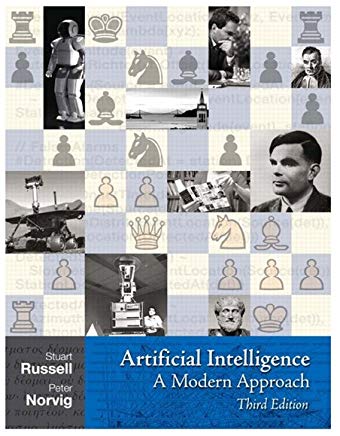Principles of Artificial Intelligence

|
Syllabus
The following gives a tentative list of topics to be covered in the course (not necessarily in the
order in which they will be covered).
Overview: foundations, scope, problems, and approaches of AI.
Intelligent agents: reactive, deliberative, goal-driven, utility-driven, and learning agents
Artificial Intelligence programming techniques
Problem-solving through Search: forward and backward, state-space,
blind, heuristic, problem-reduction, A, A*, AO*, minimax, constraint
propagation, neural, stochastic, and evolutionary search algorithms,
sample applications.
Knowledge Representation and Reasoning: ontologies, foundations of knowledge representation and reasoning,
representing and reasoning about objects, relations, events, actions, time, and space; predicate logic,
situation calculus, description logics, reasoning with defaults, reasoning about knowledge, sample applications.
Planning: planning as search, partial order planning, construction and use of planning graphs
Representing and Reasoning with Uncertain Knowledge: probability, connection to logic, independence, Bayes rule, bayesian networks, probabilistic inference, sample applications.
Decision-Making: basics of utility theory, decision theory, sequential decision problems, elementary game theory, sample applications.
Machine Learning:
learning from observations (data), problem-solving, interaction and experimentation. Representative learning algorithms. learning nearest neighbor, naive Bayes and its variants, neural networks and their variants, and decision trees and their variants, Q-learning for learning action policies, sample applications.
Sample Applications of AI, student project presentations.
Brief Survey of selected additional topics: perception, communication, interaction, and action; multiagent systems.
The primary text for the course is: Artificial
Intelligence: A Modern Approach, 3rd Edition, by Stuart Russell and
Peter Norvig.

The course will often draw upon a variety of additional references and readings to supplement
the treatment of topics available in the primary textbook. Students should consult the for specific reading assignments.
|
